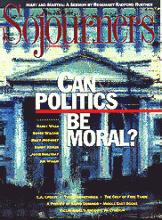A major quincentenary event begins on October 12 in the Dominican Republic, where Pope John Paul II will kiss the ground on which Christopher Columbus landed 500 years before. But the event with historical significance isn't the pontiff's gesture; rather it is the convening that day in Santo Domingo of the fourth general conference of the Latin American bishops.
The conference title, "New Evangelization, Human Promotion, and Christian Culture: Jesus Christ Yesterday, Today and Always," points to the scope and magnitude of this two-week meeting. Begun in Rio de Janeiro in 1955 and continuing at Medellin, Colombia, in 1968 and Puebla, Mexico, in 1979, these gatherings of church leadership from Central and South American countries are among the most anticipated and observed ecclesial happenings in the world. Such breakthrough concepts as "institutionalized violence," "the preferential option for the poor," and "base Christian communities" have emerged--especially from the Medellin and Puebla meetings--to inspire and challenge the church.
This writer was a direct beneficiary of the Medellin conference while serving as pastor of a large suburban parish in Lima, Peru. To have the hierarchy of one's church ask pardon for complicity in the unjust social structures of Latin America, then call themselves and all pastoral people to a break with the powerful and a concern for the oppressed--this translated for us into a radically different way of doing ministry.
It caused no end of difficulty, as well, for the Latin American church. Thousands of church people--catechists, promoters of the Word, deacons, priests, sisters, and even bishops--found themselves criticized, harassed, sometimes tortured, and even killed by those whose interests were challenged.
Read the Full Article

